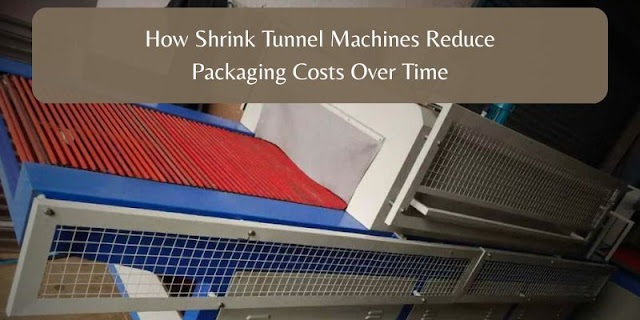In today’s competitive market, packaging efficiency plays a vital role in determining a business’s profitability. Companies are under constant pressure to deliver products quickly, safely, and at a lower cost. One piece of equipment that has proven to be a cost-effective solution in the long run is the heat-based wrapping system, often used in high-volume production lines. While the initial investment might seem significant, working with reputable shrink tunnel machine manufacturers offers a strategic advantage through sustained savings over time.
These systems are engineered to streamline the packaging process by tightly wrapping products in plastic film using consistent heat application. This not only ensures durability and tamper-resistance but also reduces the need for excessive packaging materials. By minimizing waste, companies can save substantially on film and packaging supplies, making the system more cost-effective than traditional alternatives.
Another area where these machines provide long-term benefits is labor. Automated systems reduce the need for manual handling, which lowers operational costs tied to workforce wages and training. One operator can often manage an entire line, leading to significant labor reductions. Over time, these savings contribute directly to improved profit margins.
Additionally, the precision of the equipment results in fewer errors. In traditional setups, inconsistent wrapping can lead to damaged or improperly sealed products. This can result in returns, rework, or even product loss. Heat-sealing systems, on the other hand, offer uniform application and secure finishes, reducing the chances of such costly mistakes.
It’s essential to highlight how energy efficiency further supports cost savings. Many modern models are designed to optimize heat distribution, ensuring minimal energy wastage. With rising electricity rates, using an energy-efficient unit can noticeably reduce monthly utility expenses. Systems with adjustable temperature and conveyor speeds allow operators to fine-tune performance based on product size and material type, which further minimizes energy use.
Compact design is another contributing factor. These machines often take up less space than older manual alternatives or bulky packaging stations. The space saved can be reallocated to other operations or storage, increasing overall facility efficiency. Furthermore, their modular nature allows them to be integrated into existing production lines with minimal disruptions or the need for extensive restructuring.
An added benefit is the improved protection that the packaging provides. Tightly sealed plastic films shield products from dust, moisture, and handling damage. This reduces returns due to compromised goods, enhancing customer satisfaction and preserving brand reputation. In sectors like food, pharmaceuticals, and electronics, secure packaging is not just beneficial—it’s essential.
Let’s consider maintenance and downtime. Systems from a trusted shrink tunnel machine are typically built with durability and easy maintenance in mind. Stainless steel components, modular belts, and easily accessible parts help extend equipment life and reduce repair costs. Many units come with diagnostics or alert features that notify operators of performance issues before they become critical, allowing for timely interventions and less downtime.
Another long-term benefit is versatility. These machines handle a wide range of product sizes and shapes without requiring frequent retooling. From boxed goods and beverage packs to cosmetics and printed materials, the system adapts to varied items, which means companies don’t need separate equipment for different product lines. This flexibility not only saves money but also improves production flow and planning.
Furthermore, by maintaining a sleek and professional package appearance, businesses can enhance shelf appeal. Attractive, uniform wrapping increases product visibility and can even reduce the need for additional marketing materials like printed cartons. This, in turn, lowers printing and packaging design costs over time.
Integration with automation systems such as barcode scanners, counters, or labeling equipment also contributes to operational efficiency. These enhancements reduce the time needed for secondary processes and make traceability easier, especially in industries where compliance and product tracking are essential.
In conclusion, working with experienced shrink tunnel machine manufacturers is not just a short-term upgrade—it’s a strategic investment in long-term savings. From reduced material waste and energy usage to minimized labor costs and maintenance, these systems support leaner, smarter, and more profitable packaging operations. For companies focused on scaling up while keeping overheads in check, integrating this technology into their production line offers a clear and lasting return on investment.






0 Comments